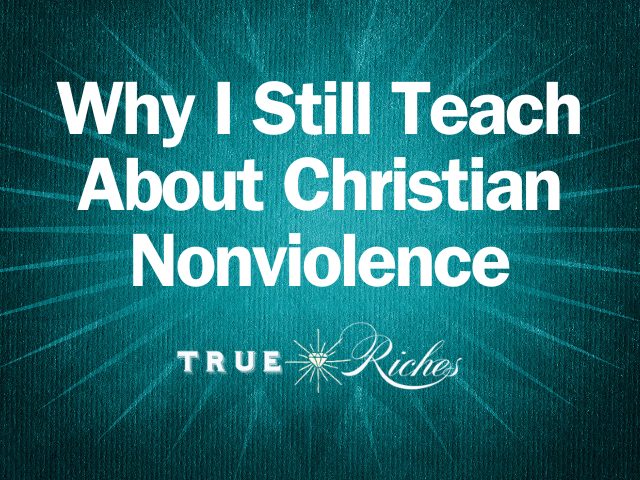Not long ago, I received an email from a well-meaning reader. They asked a question I’ve heard before, but one that still surprises me every time:
“Why do you spend so much time talking about nonviolence?”
At first, I just stared at it.
It wasn’t hostile. It wasn’t accusatory. It was just… sincere. But I’ll be honest: it caught me off guard. Because the real question I keep asking myself is, Why aren’t more Christians talking about it?
After all, we live in a world awash in blood. Mass shootings. Endless wars. Political violence. Violent riots. Deadly insurrections. Assassinations. And somehow, much of the modern church remains eerily silent. Or worse, complicit.
Consider what just happened in Minnesota.
Vance Boelter, a professing Christian and evangelical missionary, is accused of killing state Representative Melissa Hortman and her husband, and of attempting to assassinate another Democratic lawmaker and his wife. According to law enforcement, Boelter posed as a police officer, dressed in a fake uniform, and carried out what appears to be a politically and theologically motivated execution, driven by his belief that abortion and LGBTQ+ rights were signs that the church in America had gone astray. He carried a kill list of names containing dozens of political targets, many of whom were abortion clinics and Democratic lawmakers.
Boelter was no outsider to American Christianity. He attended a charismatic Bible college. He preached evangelistic sermons in Africa. He railed against abortion and “spiritual compromise.” His theology wasn’t new. It was familiar. And that’s precisely the problem.
Boelter wasn’t a professing atheist, an “illegal” immigrant, or even a foreign terrorist. He was, according to his own account, a Bible-quoting, Spirit-filled, gun-toting, Trump-supporting, pro-life Christian. He believed God was raising up prophets and believed he was one of them. And he believed violence was not just permitted, but ordained.
He came out of a religious culture that preaches spiritual warfare in a way that turns people into enemies. He came from a church atmosphere where prophets declare judgment, where apostles claim divine mandate, and where political opponents are cast as demons in disguise. He came from a Christianity where winning matters more than loving, where taking back the nation matters more than laying down your life.
We need to sit with that.
And while his actions were extreme, his theology wasn’t.
That’s what should alarm us.
Modern American Christianity, in large part, has traded the true cross of Christ for the false sword of nationalism. It’s been seduced by the illusion of political power and the rhetoric of warfare. We have dressed up the politics of fear in the language of faith. Not spiritual warfare in the New Testament sense, but instead a twisted version that frames political opponents as literal agents of Satan. When that idea takes hold, violence becomes not only permissible, but (God help us) righteous.
And so we end up with Bibles in one hand and rifles in the other. We baptize violence in the name of Jesus and glorify power, domination, and revenge while pretending we’re still following the Lamb who was slain. We’ve created a Jesus who looks less like the Lamb who was slain and more like a holy war general with an AR-15 slung over his shoulder.
This is not the faith of the early church. This isn’t the faith of the martyrs. And it is most certainly not the teaching of Jesus.
But today, we have a different gospel, one that is shaped by fear and fueled by tribalism. It is the faith of Christian nationalism and it’s not a fringe issue anymore, but has gone mainstream in far too many churches, small groups, and pulpits.
The Jesus I follow taught us to love and forgive our enemies, not shoot them. He didn’t form a militia. He formed a movement of peace. He didn’t tell Peter to grab a sword. He told him to put it away. (Matthew 26:52)
If that sounds radical, it’s because it is. The way of Jesus always has been.
And so, when I am asked why I keep talking about nonviolence, my answer is simple:
Because someone has to.
Because too many pulpits are quiet as our world is awash in blood. Because too many Christians have confused the nonviolent Kingdom of God with the violent kingdoms of this world. Because we’ve forgotten that the cross is not just a symbol of forgiveness, but a summons to suffer rather than kill.
And because there are more many more Vance Boelters out there, radicalized not by Islam nor by secularism, but by a version of Christianity that has become unrecognizable to the Jesus of the Gospels.
In sum, gospel nonviolence is not a side issue. It is not a political position. It is not optional. It is the very way of Christ.
It is my prayer that the Church recovers the gospel of peace. Otherwise, it will continue to produce disciples who believe violence is redemptive, as long as it’s in the name of the “right” cause.
But there is no cause, none at all, that justifies killing your enemy, let alone your neighbor.
There is only the cross.
And that’s where we must return.
Blessings,

Editor’s Note: This article launches our new six-week series at True Riches Academy entitled “The Cross and the Sword”, a provocative podcast and article series exploring guns, Christian nationalism, and the lost message of Jesus’ nonviolent love. Subscribe to our email list to follow the entire journey.
Have a thought or question? Please feel free to share it below.


